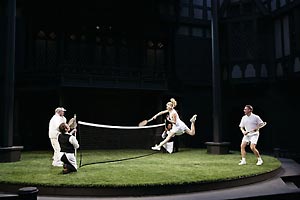Ensemble Photo: T. Charles Erickson. 2006 |
My first evening at
OSF this year closed with the new production of
The Two Gentlemen of Verona. Attention to this production from audiences here has grown in the last weeks with the
announcement that Bill Rauch, the show’s director, will assume the artistic director’s position at the end of next year following the departure of his predecessor of the last decade, Libby Appel.
This is not the first time Rauch has directed a production here. In fact he has been a constant fixture over the last four seasons leading some of the more memorable stagings including
Hedda Gabbler in 2003 and a Vegas-themed
The Comedy of Errors in 2004. Of course Rauch has a long history in Southern California with the
Cornerstone Theater Company as well as leading a long list of productions with
South Coast Repertory,
CTG’s Taper,
Pasadena Playhouse, and
La Jolla Playhouse. He has established a reputation as someone who is willing to take risks on the inventive and new and acknowledges the great import of community-based projects and initiatives.
I was thrilled to see an LA and Southern California theater figure appointed here at OSF and if this
Two Gentlemen is any indication, there are some exciting evenings ahead here is Ashland. Rauch has moved the setting of the play in an effort to emphasize that Valentine and Proteus are leaving their insular and protected world in Verona to become more worldly gentlemen in Milan at the Duke’s court. To achieve this, he exploits the concept of
rumspringa from Amish culture where youth leave home to experience the outside world’s temptations before making a decision about whether or not they will join their communities as adult members in full standing. In the production, Verona becomes an Amish enclave with characters leaving for a WASPy world of tennis courts and privilege in Milan.
Ensemble Photo: T. Charles Erickson. 2006 |
This transplant works beautifully for the most part and makes the whole affair pop visually. It also imbues many of the comic elements with a stronger sense of “town and country.” On the down side, the show still suffers from a small amount of mugging and pandering by some of the actors in what seems like an effort to augment or heighten the comic effect at times. Here we have David Kelly as Launce cursing “What the hell ?!” under his breath at moments of surprise and squirting the audience with a water bottle to emphasize his sister’s crying when he left Verona. Granted this often occurs while he is onstage with a dog which as always presents an extra challenge to overcome. While I recognize this type of engagement has its precedence in Shakespeare’s time and certainly keeps with the comic spirit of the whole piece, I can’t help also feel that it suggests the audience can’t “get” the humor otherwise. This is not an uncommon strategy here at OSF and many of the strongest regular players here get called on regularly for this kind of work including not only Kelly but also Ray Porter (absent this year although he recently popped up at
A Noise Within in Glendale) and Christopher DuVal. I certainly don't mind anachronism in theater or opera, but I do believe there is a fine line between telling us something new about the familiar and using a crutch to fill in gaps in either trust for an audience or weak material.
Still, this is a quibble in such a strong and enjoyable production with so many other virtues. Next season Rauch will direct
Romeo and Juliet and I for one look forward to see what is in store under his coming leadership.








Follow Along
Brian
Los Angeles
Follow me on Twitter